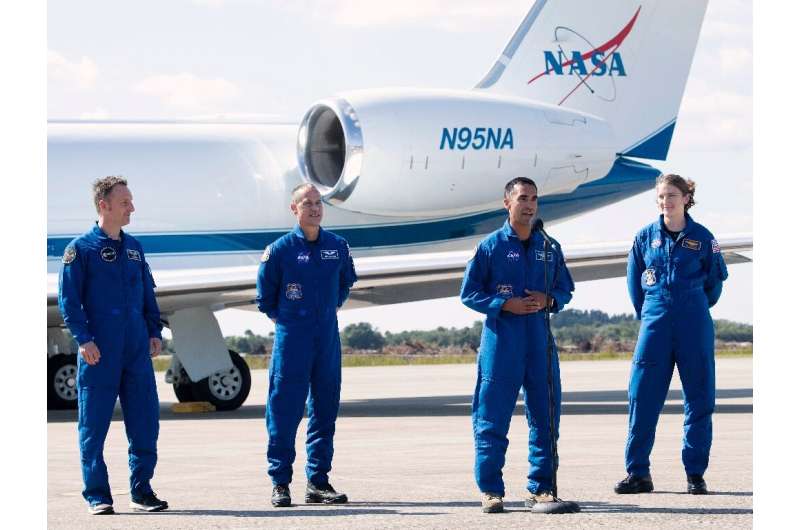
Copernical Team
Searching for Earth 2 zoom in on a star
 New Haven CT (SPX) Oct 28, 2021
Astronomers searching for Earth-like planets in other solar systems have made a breakthrough by taking a closer look at the surface of stars.
A new technique developed by an international team of researchers - led by Yale astronomers Rachael Roettenbacher, Sam Cabot, and Debra Fischer - uses a combination of data from ground-based and orbiting telescopes to
New Haven CT (SPX) Oct 28, 2021
Astronomers searching for Earth-like planets in other solar systems have made a breakthrough by taking a closer look at the surface of stars.
A new technique developed by an international team of researchers - led by Yale astronomers Rachael Roettenbacher, Sam Cabot, and Debra Fischer - uses a combination of data from ground-based and orbiting telescopes to Are we alone in the Universe? NASA calls for a "New Framework"
 How do we understand the significance of new scientific results related to the search for life? When would we be able to say, "yes, extraterrestrial life has been found?"
NASA scientists are encouraging the scientific community to establish a new framework that provides context for findings related to the search for life. Writing in the journal Nature, they propose creating a scale for ev
How do we understand the significance of new scientific results related to the search for life? When would we be able to say, "yes, extraterrestrial life has been found?"
NASA scientists are encouraging the scientific community to establish a new framework that provides context for findings related to the search for life. Writing in the journal Nature, they propose creating a scale for ev Using Charon-light Researchers Capture Pluto's Dark Side
 NASA's New Horizons spacecraft made history by returning the first close-up images of Pluto and its moons. Now, through a series of clever methods, researchers led by Tod Lauer of the National Science Foundation's National Optical Infrared Astronomy Research Lab in Tucson, Arizona, on the New Horizons team have expanded that photo album to include the portion of Pluto's landscape that wasn't dir
NASA's New Horizons spacecraft made history by returning the first close-up images of Pluto and its moons. Now, through a series of clever methods, researchers led by Tod Lauer of the National Science Foundation's National Optical Infrared Astronomy Research Lab in Tucson, Arizona, on the New Horizons team have expanded that photo album to include the portion of Pluto's landscape that wasn't dir Could Russia's Zeus TEM be a gamechanger for India's space ambitions
 Although the international community has accelerated its space ambitions, the Indian Space Research Organisation (ISRO) has significantly decreased its launches. In 2021, ISRO carried out only two launches in comparison with China's 39.
Amid a rising competition between China and the US in terms of space programmes, experts have put their weight behind Russia's Zeus Transportation and Ener
Although the international community has accelerated its space ambitions, the Indian Space Research Organisation (ISRO) has significantly decreased its launches. In 2021, ISRO carried out only two launches in comparison with China's 39.
Amid a rising competition between China and the US in terms of space programmes, experts have put their weight behind Russia's Zeus Transportation and Ener The upside-down orbits of a multi-planetary system
 When planets form, they usually continue their orbital evolution in the equatorial plane of their star. However, an international team, led by astronomers from the University of Geneva (UNIGE), Switzerland, has discovered that the exoplanets of a star in the constellation Pisces orbit in planes perpendicular to each other, with the innermost planet the only one still orbiting in the equatorial p
When planets form, they usually continue their orbital evolution in the equatorial plane of their star. However, an international team, led by astronomers from the University of Geneva (UNIGE), Switzerland, has discovered that the exoplanets of a star in the constellation Pisces orbit in planes perpendicular to each other, with the innermost planet the only one still orbiting in the equatorial p Russia will fly four tourists into space in 2024
 Earlier this month, a Russian actress and a film director spent 12 days in orbit making the world's first movie in space. Director General of Roscosmos Dmitry Rogozin said that the space mission for the film crew of "The Challenge" was "a solid five".
Glavkosmos, a subsidiary of the Russian State Space Corporation Roscosmos, has signed a preliminary agreement under which two commercial fli
Earlier this month, a Russian actress and a film director spent 12 days in orbit making the world's first movie in space. Director General of Roscosmos Dmitry Rogozin said that the space mission for the film crew of "The Challenge" was "a solid five".
Glavkosmos, a subsidiary of the Russian State Space Corporation Roscosmos, has signed a preliminary agreement under which two commercial fli Ingenuity Mars Helicopter Flight 14 Successful
 The successful 14th flight of NASA's Ingenuity Mars Helicopter took place shortly after 1:18 a.m. PDT Oct. 24 at Jezero Crater. As planned, the helicopter executed its first 2,700 rpm flight, proving that Ingenuity is capable of flying in the weeks and months ahead on Mars, during which seasonal changes on the surface will result in decreases in air density.
The short 23-second flight incl
The successful 14th flight of NASA's Ingenuity Mars Helicopter took place shortly after 1:18 a.m. PDT Oct. 24 at Jezero Crater. As planned, the helicopter executed its first 2,700 rpm flight, proving that Ingenuity is capable of flying in the weeks and months ahead on Mars, during which seasonal changes on the surface will result in decreases in air density.
The short 23-second flight incl Kuaizhou lifts off successfully, places satellite in orbit
 China launched a high-resolution Earth-observation satellite into space aboard a Kuaizhou 1A carrier rocket on Wednesday afternoon, according to the China Aerospace Science and Industry Corp.
In a statement, the State-owned space contractor said that the solid-propellant rocket blasted off at 2:19 pm from the Jiuquan Satellite Launch Center in northwestern China, and placed the satellite -
China launched a high-resolution Earth-observation satellite into space aboard a Kuaizhou 1A carrier rocket on Wednesday afternoon, according to the China Aerospace Science and Industry Corp.
In a statement, the State-owned space contractor said that the solid-propellant rocket blasted off at 2:19 pm from the Jiuquan Satellite Launch Center in northwestern China, and placed the satellite - NASA sending four astronauts to ISS on Sunday

NASA is teaming up with SpaceX once more to send four astronauts to the International Space Station on Sunday, including three first-timers.
The crew of mission "Crew-3" will spend six months on the orbital outpost, conducting research in areas including material sciences, health, and botany, to help inform future deep space exploration and benefit life on Earth.
Scientists measure the atmosphere of a planet 340 light-years away

An international team of scientists, using the ground-based Gemini Observatory telescope in Chile, is the first to directly measure the amount of both water and carbon monoxide in the atmosphere of a planet in another solar system roughly 340 light-years away.
The team is led by Assistant Professor Michael Line of Arizona State University's School of Earth and Space Exploration, and the results have been recently published in the journal Nature.
There are thousands of known planets outside of our own solar system (called exoplanets). Scientists use both space telescopes and ground-based telescopes to examine how these exoplanets form and how they are different from the planets in our own solar system.
For this study, Line and his team focused on planet "WASP-77Ab," a type of exoplanet called a "hot Jupiter" because they are like our solar system's Jupiter, but with a temperature upwards of 2,000 degrees Fahrenheit.

